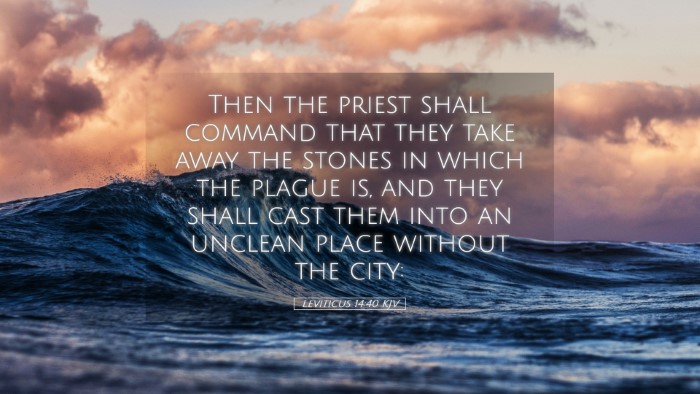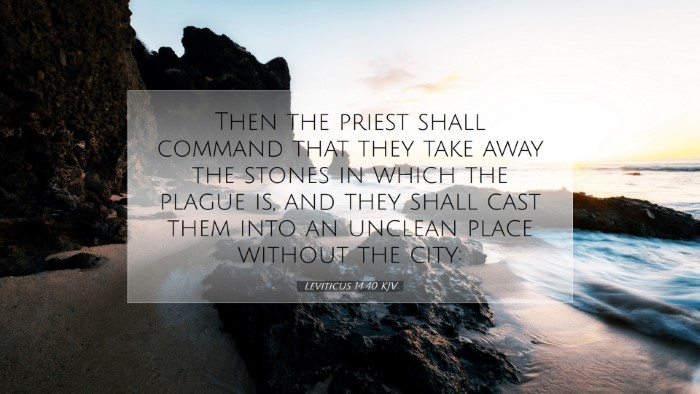Bible Commentary on Leviticus 14:40
Verse Context: Leviticus 14:40 states: "Then the priest shall command that they take away the stones in which the leprosy is, and they shall cast them into an unclean place without the city." This directive is part of the wider ceremonial regulations concerning the purification of a house from leprosy, reflecting the seriousness of this affliction and the associated ritual cleansing process.
Introduction to Levitical Law
The laws presented in the book of Leviticus serve to set Israel apart as a holy nation. They establish guidelines that govern not only ritual practice but also community health and moral integrity. Leviticus 14 particularly focuses on the ceremonial laws regarding leprosy, a condition often equated with sin or disease that necessitates a physical and symbolic cleansing.
Commentary Insights
1. Understanding Leprosy in Biblical Context
Matthew Henry's Perspective: Leprosy is depicted as a severe affliction, looked upon as a result of sin. It serves both as a physical ailment and a spiritual metaphor. Henry points out that leprosy could be seen as a representation of sin; just as leprosy corrupts the flesh and leads to isolation, so does sin corrupt the spirit and separate one from God and community.
Albert Barnes' Exposition: Barnes elaborates on the health implications of leprosy. He notes that the command to remove the stones affected by leprosy indicates a thorough purging of the infection. The process symbolizes the necessity of removing sinful influences from one’s life, mirroring the care needed to maintain spiritual cleanliness.
Adam Clarke's Analysis: Clarke emphasizes the importance of ritual purity in maintaining the sanctity of the community. He notes that the removal of contaminated materials (in this case, stones) is essential to prevent contamination and ensure communal health. This reflects God’s commitment to purity and highlights the gravity of sin.
2. The Role of the Priest
The involvement of the priest in this ceremonial process is crucial. As spiritual leaders, priests function as intermediaries between God and the people, tasked with ensuring adherence to divine laws.
Matthew Henry's View: Henry asserts that the priest's command signifies divine authority in matters of health and holiness. The priest acts under God's direction, reminding the community of their covenant relationship. The dismissal of the affected stones serves as a spiritual and practical separation from infection, demonstrating how leaders play an essential role in guiding congregants toward purity.
Albert Barnes' Observation: Barnes sees the priest's responsibilities as an illustration of pastoral care in the church. Just as the priest examines and directs action in a physical ailment, church leaders today are called to discern and address spiritual disease within the community.
Adam Clarke's Perspective: Clarke remarks that the priest’s commands are to ensure a deliberate and systematic approach to restoring purity. The priest not only acts as a judge but also as a healer, reflecting Christ's role as the Great High Priest who reconciles humanity to God.
3. The Concept of Clean and Unclean
Leviticus continually addresses the distinction between clean and unclean, which is foundational to the Jewish understanding of holiness. This verse underscores the seriousness with which these categories were treated in ancient Israel.
Matthew Henry's Commentary: Henry stresses that the act of casting stones away signifies the rejection of what is unclean. It serves as a reminder to the Israelites—and to contemporary believers—of the need to distance themselves from wrongdoing and spiritual corruption.
Albert Barnes' Insight: Barnes points out that being 'unclean' is more than just a physical state; it represents a moral and spiritual condition that requires careful attention and action to be rectified. Emphasizing this aspect can be instructive for those today who seek a deeper understanding of personal sanctification.
Adam Clarke's Understanding: Clarke elaborates that the concept of purity is a vital theme that resonates throughout Scripture, ultimately culminating in the New Testament's call for holiness. The physical acts of purification serve as foreshadowing of the spiritual cleansing found in Christ.
Practical Applications
The directives in Leviticus 14:40 are not merely historical accounts but have profound implications for spiritual practice today.
1. The Call to Purity
Believers today are called to examine their lives for areas of spiritual leprosy—behaviors and attitudes that contaminate their relationship with God and others. Just as the Israelites removed stones affected by leprosy, Christians must intentionally discard sin from their lives.
2. Leadership and Accountability
The priest's role in this process speaks to the importance of spiritual leadership within the church. Pastors, elders, and church leaders are tasked with encouraging accountability and offering guidance in spiritual matters, ensuring a community that is committed to holiness.
3. Community Health
The example set in Leviticus also teaches lessons about communal responsibilities. Sin can have a contaminating effect on the community of faith, thus it is critical for the church to engage in regular self-examination and collective responsibility for purity.
4. Reflection on Christ's Healing
Finally, this verse points to the ultimate healing that is found in Christ. Just as leprosy required provision for purification, believers today find their cleansing through the sacrifice of Jesus. The act of casting away unclean elements symbolically directs believers to place their trust in the Lamb who takes away the sins of the world.
Conclusion
Leviticus 14:40 and its associated laws offer profound insights into the nature of sin, the importance of community purity, and the roles of leadership in spiritual matters. Reflecting on these ancient statutes encourages contemporary believers to seek holiness, support one another in faith, and understand the depths of God's grace in the context of leprosy's symbolism of sin.


